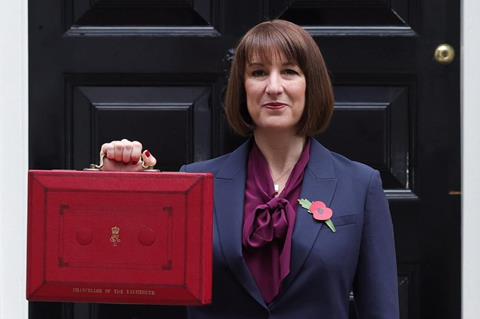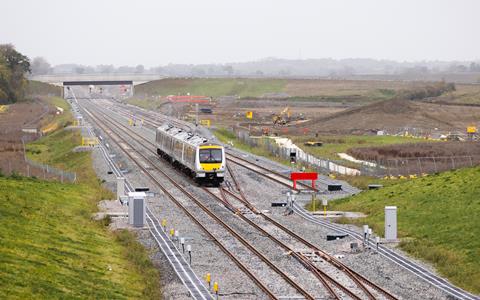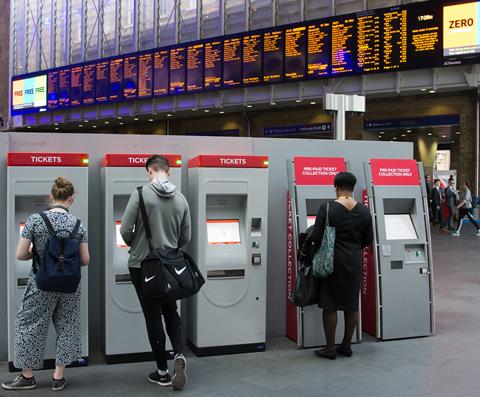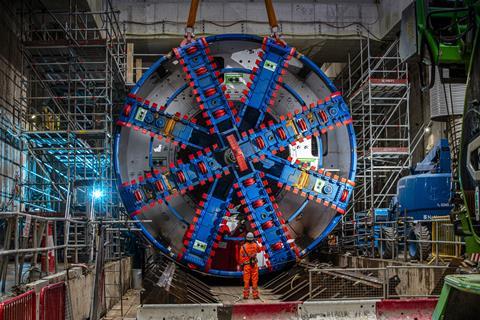
UK: Funding for the construction of the High Speed 2 tunnels from Old Oak Common to London Euston, and commitments to the ongoing Transpennine Route Upgrade and to take East West Rail to Cambridge were included in the budget presented by Chancellor of the Exchequer Rachel Reeves on October 30.
The budget document said ’well-targeted transport investment is a key contributor to the government’s economic growth mission and drives productivity growth by increasing access to labour markets, and unlocking areas for wider development including housing’.
DfT budget

The Department for Transport’s settlement provides £30·0bn in 2025-26, up £1·2bn year-on-year.
This includes an additional £200m for City Region Sustainable Transport Settlements, bringing local transport spending for metro mayors in 2025-26 to £1·3bn. This will fund projects including the renewal of Sheffield’s Supertram network and the development of the West Yorkshire Mass Transit project. There is £485m for Transport for London’s capital renewals programme in 2025-26; this includes funding for rolling stock on the Piccadilly and Elizabeth lines.
The government is committing to the East West Rail project to Cambridge, and announced funding to upgrade the Marston Vale Line so that services will run between Oxford and Bedford from 2030. Consultation for the next stage of the project will begin during November, having been postponed during the pre-election period.
The government will continue delivery of the Transpennine Route Upgrade between York and Manchester via Leeds and Huddersfield, and is ‘maintaining momentum’ on Northern Powerhouse Rail by progressing planning and design work.
Funding for the construction of the tunnels required for HS2 trains to terminate in central London is intended to catalyse private investment into the station and local area.
Reform and fares

The government said its ongoing reforms aim to improve the performance and reliability of rail services. Subsidy for passenger services has increased to cover the drop in revenue as travel patterns have changed since the pandemic, and the government ’will look to recover this shortfall to support services and ensure the railway is able to operate effectively’.
Plans for reform will look at changes to fares, services and workforce practices with the aim of increasing efficiency, reducing costs, boosting ridership and revenue, and improving performance.
The annual regulated rail fares cap will rise by 4·6% on March 2 2025, one percentage point above RPI. Subject to an industry proposal, the government will also agree a £5 increase in the price of railcards (except the disabled person’s railcard); it says on average railcard holders save up to £158 per year.
The government also ’recognises the value that rail manufacturing brings to the UK and is in the early stages of agreeing a rolling stock strategy that will bring stability to the sector’.
Rail industry responses

Rail Partners Chief Executive Andy Bagnall said ‘filling the capacity gap left by the cancellation of the northern section of HS2 is still essential if we are to encourage more people to travel by train and to unlock freight capacity to reduce congestion by moving goods off the roads and onto the railway’.
On the fare rises, he said ‘the focus must be on growing passenger numbers, not making current passengers pay more’, and he called for ‘a more favourable environment for growth’ so that ’freight customers aren’t priced out of making the right decision for the environment by rising rail costs compared to road haulage’.
Business Travel Association CEO Clive Wratten said ‘passenger experience is at an all time low. Rail travel is a necessity for businesses and individuals, but additional costs must lead to tangible benefits for travellers.’
Railway Industry Association Chief Executive Darren Caplan said ‘looking ahead to the comprehensive spending review and 10-year infrastructure strategy due next year, we hope the government will consolidate on today’s commitments by setting out a long-term investment pipeline for both infrastructure and rolling stock, giving businesses the confidence to continue to invest.’
Jason Prince, Director of the Urban Transport Group, said ’these measures will enable our member transport authorities and their mayors to make the best decisions for their local communities and continue to invest in good transport services and infrastructure. We look forward to working with government on the finer details of specific funding arrangements.’
Noel Dolphin, Head of UK Projects at Furrer + Frey, said ‘merely completing existing rail projects is a far cry from the bold action needed to secure the climate resilience and modern rail network only a rolling programme of electrification can deliver.’
Asiya Jelani, Business Development Director at Worldline UK&I, said ‘rail should not be viewed merely as a cost to be managed. The future of British rail depends on balancing necessary financial adjustments with building a skilled workforce and delivering an improved customer experience through tech innovation.’
Naomi Horton, partner at law firm Ashurst, said ‘the Chancellor’s stated aims are a great start, we will need to see much more in the way of specifics to understand how these challenges will be achieved’.
Peter Hogg, UK Cities Director at Arcadis, said ’there is continuing support for transport projects, particularly in the north — albeit many are existing programmes and we would hope to hear more about news of commitments to Northern Powerhouse Rail, Lower Thames Crossing and the HS2 legacy in the spring. The commitment to beginning tunnelling the Old Oak Common to Euston tunnels is a cautious first step.’
Costain CEO Alex Vaughan said ‘the UK needs to reset its relationship with infrastructure by committing to a 10 or 20-year plan overseen by a dedicated Minister for Infrastructure. This will enable essential infrastructure to be delivered more productively, whilst providing consistency and continuity of demand for investors and the supply chain.’
The High Speed Rail Group said ‘rail investment is far more than a short-term cost: it is a driver of national growth and regional connectivity’, adding ‘we hope that an era of fragmented, short-term decision making has been ended, in favour of a move towards a cohesive vision for the future of UK rail’.



